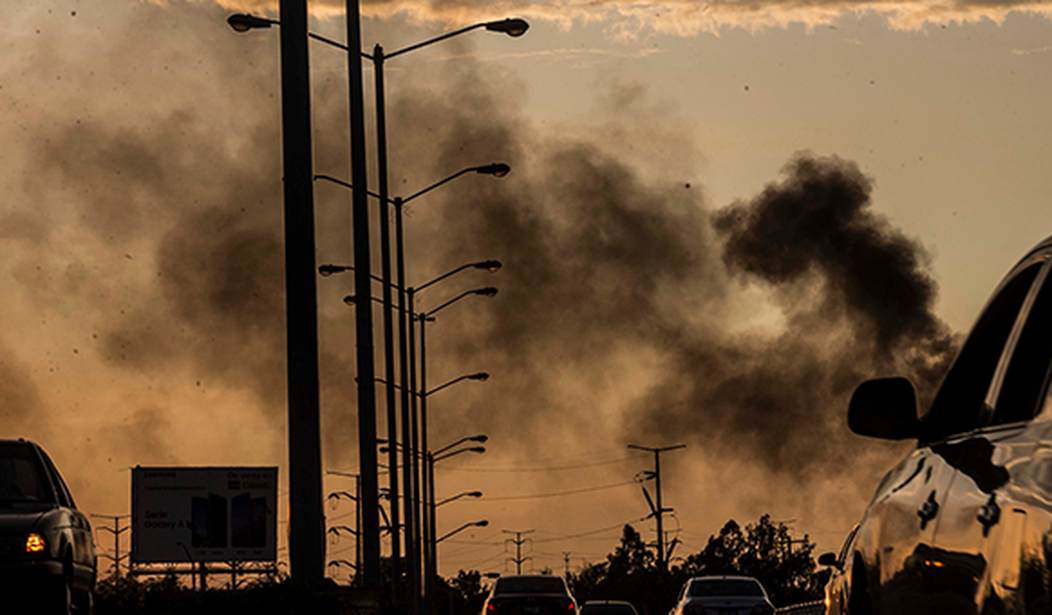The Mexican government contends in its $10 billion lawsuit against U.S. gunmakers that our firearms industry is willfully aiding and abetting the drug cartels by (among other things) allowing their guns to be trafficked south of the border. But a recent move by Mexico's federal government highlights one key way the cartels are acquiring their firepower: through corrupt government officials.
In the state of Sinaloa, a civil war has broken out between competing factions of the Sinaloa cartel. More than 140 people have been killed in just the past month, and as the New York Times details, the government's response has included one unusual move.
“We are at a critical moment right now,” said Eduardo Guerrero, a Mexico City-based security analyst. “If they don’t stop what is happening in Sinaloa soon, it will become unmanageable.”
The federal government sent 1,100 soldiers to patrol the streets, and the army seized the weapons of Culiacán’s municipal police force, a move experts say reflects concern about collusion between the cartel and the local officers.
While Mexico wants to pin the blame for cartel violence on U.S. gunmakers, it's fueled, at least in part, by corruption at all levels of Mexico's government, with officials diverting legally imported firearms meant for the military and police to the drug cartels. This isn't exactly a new problem either. Sheryl Attkisson reported on the sale of the corruption for CBS News more than a decade ago.
Selling weapons to Mexico - where cartel violence is out of control - is controversial because so many guns fall into the wrong hands due to incompetence and corruption. The Mexican military recently reported nearly 9,000 police weapons "missing."
Yet the U.S. has approved the sale of more guns to Mexico in recent years than ever before through a program called "direct commercial sales." It's a program that some say is worse than the highly-criticized "Fast and Furious" gunrunning scandal, where U.S. agents allowed thousands of weapons to pass from the U.S. to Mexican drug cartels.
CBS News investigative correspondent Sharyl Attkisson discovered that the official tracking all those guns sold through "direct commercial sales" leaves something to be desired.
One weapon - an AR-15-type semi-automatic rifle - tells the story. In 2006, this same kind of rifle - tracked by serial number - is legally sold by a U.S. manufacturer to the Mexican military.
Three years later - it's found in a criminal stash in a region wracked by Mexican drug cartel violence.
That prompted a "sensitive" cable, uncovered by WikiLeaks, dated June 4, 2009, in which the U.S. State Department asked Mexico "how the AR-15" - meant only for the military or police - was "diverted" into criminal hands.
And, more importantly, where the other rifles from the same shipment went: "Please account for the current location of the 1,030 AR-15 type rifles," reads the cable.
There's no response in the record.
Those direct commercial sales have continued since Attkisson's report in 2011. According to the Center for International Policy, there were $732,771,037 in commercial sales to Mexico just in 2021. Given that Mexico only has two gun stores in the entire country, the vast majority of these sales were to the Mexican police and military, and we have no idea how many of those guns have been diverted to the cartels over the years.
The decision to disarm the local police in Culiacán, however, shows the Mexican government is well aware of these diversions, even as it scapegoats U.S. gunmakers in their lawsuit. That litigation, backed by gun control activists here at home, also ignores the role that the "hugs, not bullets" strategy adopted by the Mexican government has played in empowering the cartels all across the country. Again, from the Times' report:
Under former President Andrés Manuel López Obrador, the government tried to avoid direct confrontations with armed groups in an effort to limit mass casualties. Ms. Sheinbaum, his protégé, has vowed to continue that strategy.
“Entering with firepower would cause a war,” Ms. Sheinbaum said recently, adding that security forces must prioritize protecting civilians “but not generate more confrontation that causes more deaths.”
Gen. Francisco Jesús Leana Ojeda, who until recently was head of the armed forces in Sinaloa, told reporters that the state’s security “doesn’t depend on us, it depends on the rival groups stopping their confrontations.” He was removed from his post this month, local media reported.
Mr. Rocha Moya, the governor, distanced himself from the comments, which sparked outrage. “Obviously the state can’t just wait and see when they decide to stop,” he said.
That may be obvious, but it's also essentially how the Mexican government has operated under the AMLO regime, and new president Claudia Sheinbaum promises more of the same. It's not the U.S firearms industry that's aiding and abetting the cartels. It's government officials in Mexico. Whether through the corrupt diversion of guns meant for the military and police or the "hugs, not bullets" approach to the cartels themselves, the blame for the cartel violence rests squarely on the inability and unwillingness of authorities in Mexico to get tough on the criminal syndicates.









Join the conversation as a VIP Member